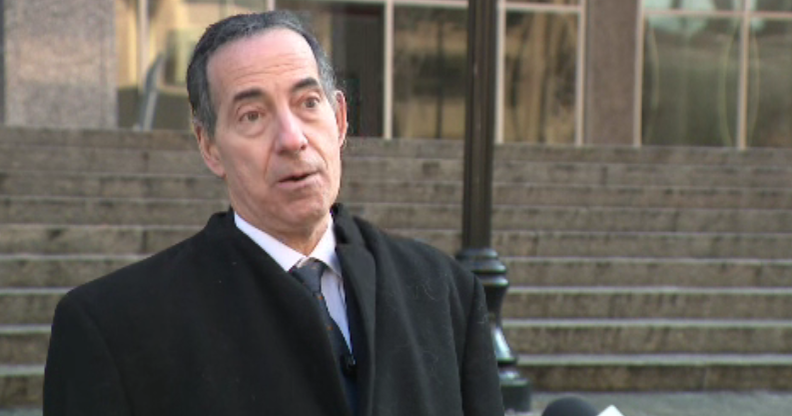Transcript: Rep. French Hill of Arkansas on "Face the Nation," May 28, 2023
The following is a transcript of an interview with Rep. French Hill, Republican of Arkansas, that aired on "Face the Nation" on May 28, 2023.
MARGARET BRENNAN: And that's where we're turning now to Arkansas Republican Congressman French Hill, who joins us from Little Rock. Good morning to you, sir.
REP. FRENCH HILL: Margaret, good to be with you.
MARGARET BRENNAN: Let's pick up where we left off. The leader says 150 Republican votes can be delivered by the GOP. Do you have those votes for this deal?
REP. HILL: I feel confident that we'll have those votes after people review the text, talk with their colleagues, compare it to our goals. Speaker McCarthy is the only person who's demonstrated urgency on this point starting when he was sworn in, and starting with this first meeting with President Biden to get to a sensible and responsible increase to the debt ceiling. He had to red lines, Margaret, no tax increase and not a clean debt ceiling. And I think he's achieved that.
MARGARET BRENNAN: Okay. So it will be just one bill, one vote.
REP. HILL: That's my view.
MARGARET BRENNAN: Okay, that decision has been made, it sounds like based on what you're indicating here. In terms of the votes, though, you still have to be able to deliver those 150 Republicans to vote this through. Hakeem Jeffries says he can get the Democrats in line. We'll see. Can you guarantee that this vote will happen and will succeed on first try?
REP. HILL: I believe it will. I'll tell you why. We had our plan, which we passed as you noted on April 26, with the full support of the American people to stop the avalanche of spending and each component we had of limiting the rate of growth limiting the amount of–
MARGARET BRENNAN: But that's past tense. I don't want to talk about the past tense that bill's dead. We're talking about the deal.
REP. HILL: No, no, no, it's not dead, no no no–
(CROSSTALK)
MARGARET BRENNAN: I want to talk about whether you can actually deliver that on Wednesday–
REP. HILL: We can. We can.
MARGARET BRENNAN: This Wednesday is when the speaker says it will happen on this tentative agreement.
REP. HILL: Okay, well, my point is that it's not past tense. Each of the components we had in the bill on the 26th is reflected in this negotiated deal and principle that the speaker achieved with President Biden, and that's why I believe that we'll have those votes on Wednesday because we limit the rate of growth, we cut spending, we clawback unneeded spending and recisions. We stop unnecessary spending, and we get our economy growing with regulatory relief and by encouraging more people back to work.
MARGARET BRENNAN: Okay. Well, Chip Roy and others from the Freedom Caucus said they don't even want to see the vote happen, and they're going to try to block it.
REP. HILL: Okay, well, they need to read the text and visit with their colleagues.
MARGARET BRENNAN: Have you read it? Because we haven't.
REP. HILL: No, I'm going to read it this afternoon when it's posted on the House website.
MARGARET BRENNAN: Okay. So in terms of what is being drafted, there's differences here in terms of spending freezes, and which year we're comparing it to. The spin for the Republicans and Democrats is very different on this, what is actually going into the text?
REP. HILL: Well, we're going to limit the rate of spending growth for nondefense, nonveteran spending, it will be at FY 22 levels, Defense and Veterans will be at FY 23 levels, and then we kept the growth right and spending 1% a year for six years. That was a key component in the April 26 bill when we offered 1% of growth for 10 years. We also are going to go to a Massey-Emmer approach on appropriations bills, which finally opens up and gives strength to the appropriations process, that if all 12 bills are not passed by September 30, then we go to a continuing resolution at 99% of current year spending levels. That's an immense incentive for the Congress to do its work and pass all 12 bills in the House and the Senate. And that's the spending issue. And then we- we clawback, as you noted, COVID relief money, other decisions, we stop the first year of the 10 year increase in the IRS budget that's nearly $2 billion of spending stopped. Of that 80 billion that was to be spent over 10 years for hiring IRS agents.
MARGARET BRENNAN: Okay. Well, we will wait to see that text as well. I want to get to what you were just talking about in terms of freezes. I mean, every American knows that, that your dollar doesn't go as far as it used to because of inflation. This may be a problem for you in the Senate, because we already have Republican Senator Lindsey Graham criticizing this deal. And the defense increase, as you refer to it, because it doesn't keep up with inflation. How do you sell that? Because he just- he's- he's said that national security threats are increasing. And this is a disaster for the Navy and a win for China and Putin. How do you respond to that?
REP. HILL: Well, first, I think that's why speaker McCarthy and President Biden agreed to the $888 billion spending level, which was the President's level plus 3% inflation was exactly that point contained in this negotiated deal. I also would say look, we've had a gross overreaction in fiscal and monetary policy since the pandemic. And that's why House Republicans are trying to slow the growth in spending and get back to normal before the pandemic, and all areas are going to have to sacrifice. But look, the speaker and the President agree, we want to preserve defense pervert, preserve veterans, and take Social Security and Medicare off the table. And those are big chunks of the federal budget.
MARGARET BRENNAN: Well, this has to make it through the House and then through the Senate. So it sounds like there's still a lot of convincing you need to do on those points you just laid out. Are you worried that the scope of this isn't big enough for you to then go back and sell to some of the skeptical members of your caucus who wanted to see bigger reductions?
REP. HILL: Well, I'm one of those people that wanted bigger reductions, but I also recognize we control only the House of Representatives. We've got to get it through the Senate, as you note and the Biden administration controls the central government here. If they were so concerned about the debt ceiling, they could have negotiated with McCarthy a lot earlier, they could have even raised the debt ceiling when they controlled both branches of the House and Senate and the federal government in December, but they didn't. So this is the world we have. It's not the spending cuts, I would prefer. But when you look at PAYGO on regulatory costs, that's a big change. When you look at the Massey-Emmer note on 99% CR on appropriations, that's a big change. So I think we're in the absolute right direction. And it absolutely follows the goals of House Republicans as laid out on April 26th.
MARGARET BRENNAN: All right. Congressman, thank you very much for coming on giving us a glimpse into what Republicans are putting on paper right now. FACE THE NATION will be back in a minute. Stay with us.



